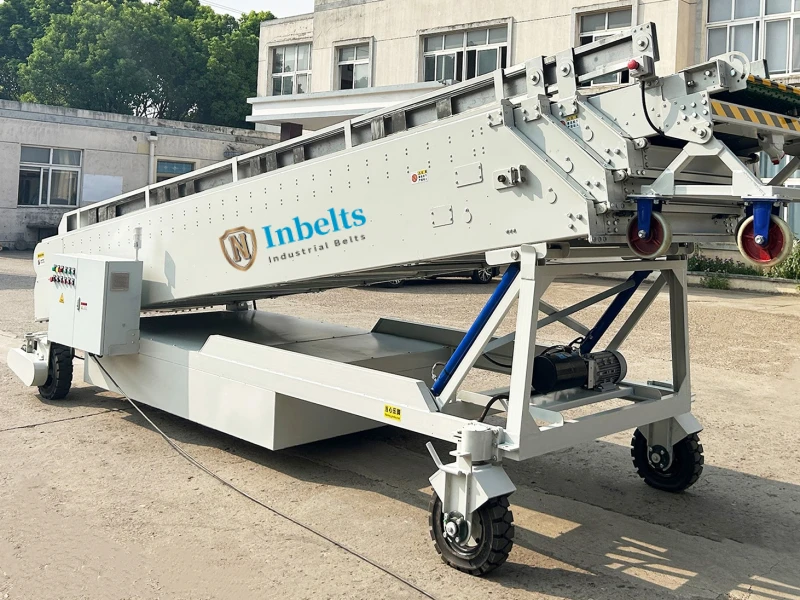
New Conveyor Technology Leads the Intelligent Transformation
With the rapid development of the logistics industry, intelligent logistics has become a new trend and direction for growth. As key equipment for material transportation, conveyors are also showing new technological innovations and development trends in the realm of intelligent logistics. This article will introduce the application and advantages of conveyor technology innovations in the intelligent logistics field, exploring their important role in driving digital transformation.
1. Application of Intelligent Technology in Conveyors
- Automated Control Systems: Traditional conveyors generally require manual intervention and operation. However, modern intelligent conveyors utilize automated control systems to achieve fully automatic operation and real-time monitoring. Technologies such as PLC control and sensor detection enable precise control of conveyor speed, start and stop functions, and real-time monitoring of material conditions, thereby improving operational efficiency and safety.
- Wireless Communication Technology: By integrating wireless communication technology into conveyor systems, real-time communication and data transfer between devices are enabled. This allows equipment to interact and exchange information seamlessly, reducing manual intervention and increasing operational efficiency.
- Artificial Intelligence Technology: By leveraging artificial intelligence technologies like machine learning and deep learning, conveyors can automatically adjust operating parameters and optimize transport routes based on historical and real-time data. Through learning and optimization algorithms, conveyor systems can adapt to changing environments in a more intelligent and efficient way.
2. Advantages and Functions of Intelligent Conveyors
- Improved Logistics Efficiency: Intelligent conveyors reduce manual intervention through automated controls and optimization algorithms, automatically adjusting operating parameters to enhance the efficiency of material transport and handling. Additionally, intelligent conveyors can adjust speed and routing according to real-time demands and material characteristics, enhancing logistics flexibility and responsiveness.
- Reduced Operating Costs: Intelligent conveyors reduce labor input and costs through unmanned operation and automated control. They also enable real-time monitoring and data analysis of materials, optimizing inventory management and warehouse space utilization, further reducing operational expenses.
- Enhanced Safety: Intelligent conveyors use sensors and monitoring equipment to provide real-time monitoring of materials and equipment, quickly identifying anomalies, issuing warnings, and handling issues promptly to improve the safety and reliability of transport processes.
- Driving Intelligent Logistics Transformation: As an essential part of intelligent logistics systems, intelligent conveyors drive the digital evolution of the logistics industry. Through integration with other smart devices and systems, intelligent conveyors enable smart integration and collaborative operations, further enhancing logistics efficiency and quality.
3. Development Trends in Intelligent Conveyors
- Data-Driven Optimization: Using big data and cloud computing technology, real-time analysis and processing of belt conveyor and roller conveyor operation data can provide insights for optimization and improvement, further boosting operational efficiency and precise forecasting.
- Networking and IoT Applications: Intelligent conveyors can exchange data and interact with other devices, systems, and platforms, enabling automated flow and real-time monitoring of logistics information. By integrating IoT technology, conveyors achieve intelligent management and remote control, increasing automation and intelligence in logistics operations.
- Advanced AI and Machine Learning Applications: With artificial intelligence and machine learning, intelligent conveyors can make more autonomous decisions and optimize scheduling. Through learning and analyzing large volumes of data, they can predict and manage anomalies, further improving efficiency and safety.
- Eco-Friendly and Energy-Saving Innovations: Intelligent conveyors offer significant advantages in energy saving and emissions reduction. By using high-efficiency, energy-saving drive systems and energy consumption monitoring, they enable rational energy use and waste reduction, lowering operating costs and enhancing environmental benefits.
- Virtual Simulation and Visualization Applications: With virtual simulation and visualization technologies, intelligent conveyors can simulate and visualize the entire operation process. Through visual interfaces and real-time monitoring systems, operators can monitor and adjust conveyor status and parameters in real-time, enhancing the accuracy and science of production management.


Leave Me Your Requirement!